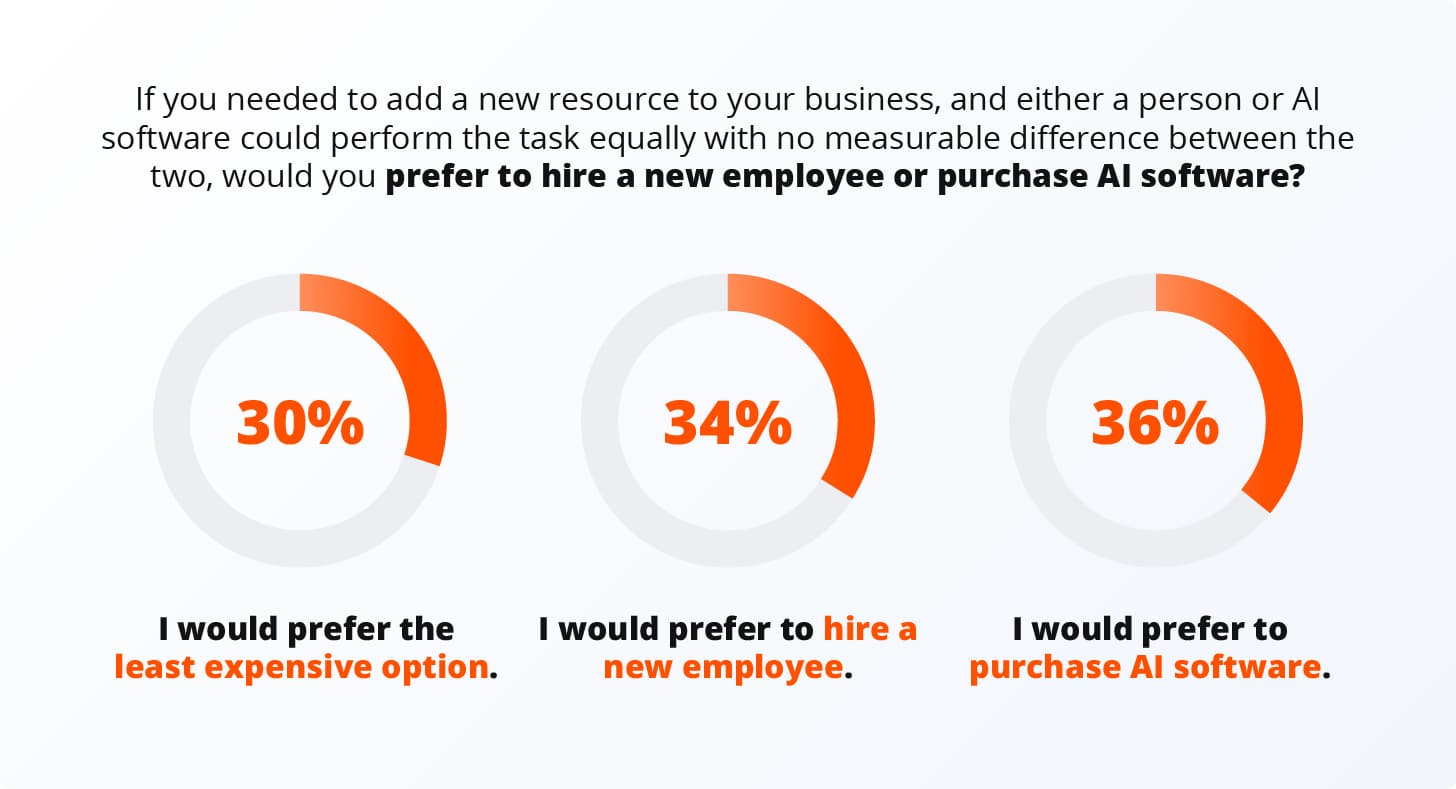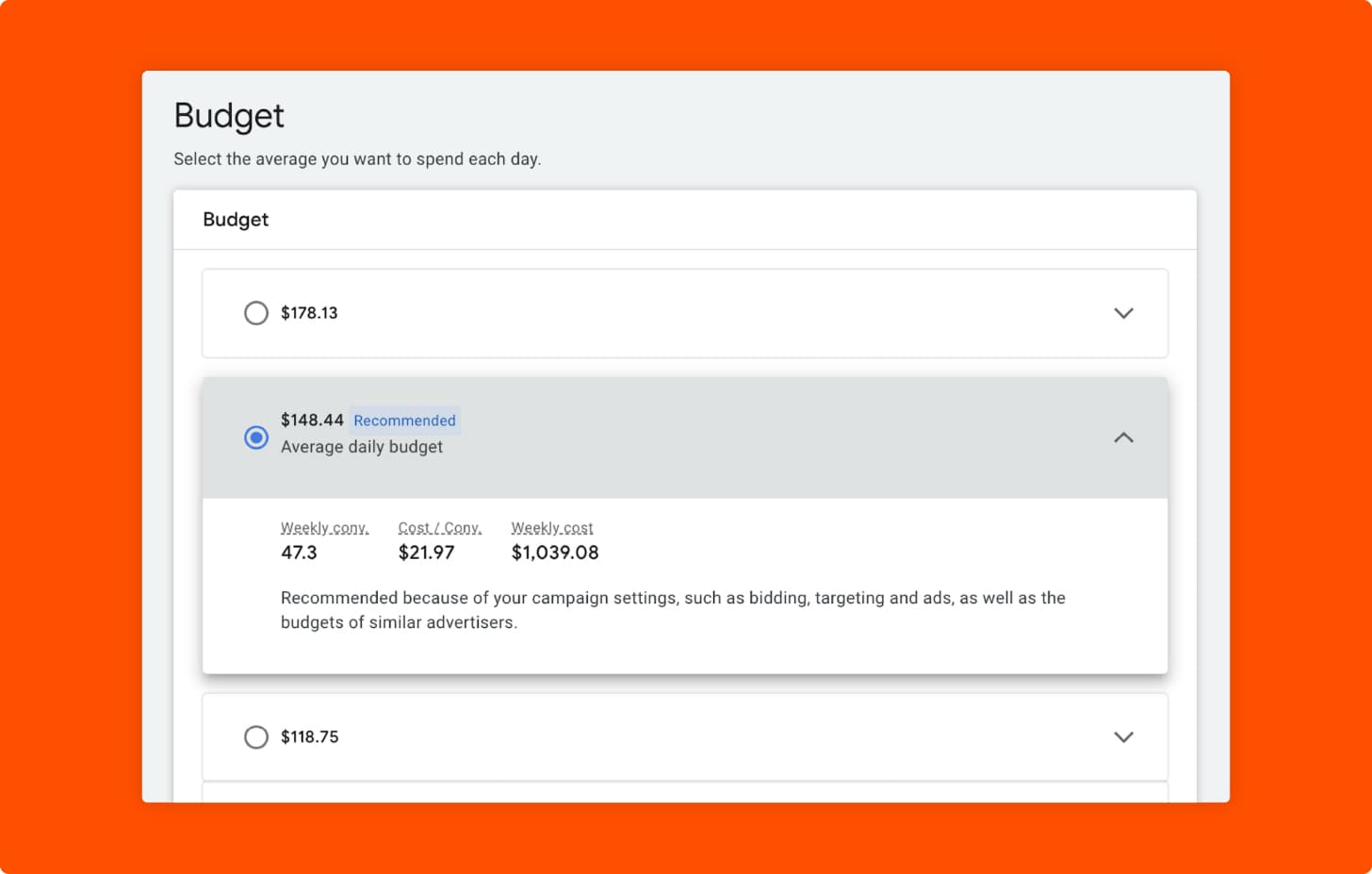AI is changing the game for small business owners, and our research has found that more owners are integrating this technology into their operations every day.
Nearly four in ten small business owners already use AI. And that number is only expected to grow before next year. Those who use AI have found it has increased their productivity, automated tasks, and improved their overall workflow. 87% of owners say it saves them time, and 71% believe it helps them compete with larger firms.

As AI grows in popularity, small businesses should understand how it can enhance daily operations. Not only will it increase sales, but it will save you from completing mundane tasks that pile up throughout the day. Instead, you can focus on what matters most to your business: your time and helping customers.
Let’s review a few ways AI is helping small business owners and how these strategies impact your company.
How AI Can Help Small Businesses
Our research found that the top uses of AI for small businesses are content marketing (58%), social media (49%), and customer relations (40%).
Let’s look at how you can leverage AI for these disciplines and others.

1. Email Marketing
AI has made email marketing significantly more manageable for small businesses. It can enhance email campaigns through audience segmentation, personalized content, and optimal email timing – increasing engagement rates by sending the right messages to the right customers.
In other words, AI can organize your contacts into groups based on information found in your CRM. After you write your email, AI will personalize the message for each group. Finally, delivery times can significantly impact open rates, so AI systems will search for the best times to send emails to each of your customers. As a result, owners send customers a continuous stream of optimized emails simply by drafting one email and having AI do the rest.
AI Uses for Email Marketing:
- Audience Segmentation: AI can organize your contacts into groups of customers based on different characteristics.
- Content Personalization: You can use AI to generate and edit content so that it’s customized to a specific audience or customer.
- Delivery Optimization: AI can find the best times to send emails based on previous open rates and engagement data.
2. Social Media
49% of businesses that use AI, use it for social media. AI can recommend the best times to post, predict content performance, and suggest changes that help your social media content get more engagement and reach the right people.
The biggest advantage is that you can craft full-fledged social media campaigns, even if you’re a little short on time to spend on marketing. AI assistants like ChatGPT can help you write captions, while social media management tools like Ocoya can make suggestions to improve your content, and help you schedule it across all social channels. Not only can this save time on creating content, but it can help provide reassurance that your content resonates with the right audience.
AI Uses for Social Media:
- Content Creation: AI can generate text, images, videos, audio, and more that you can publish as social media content. Note that different platforms will have their own rules for AI-generated content, so you may not have consistent success when posting the same content across platforms.
- Scheduling Optimization: AI-powered social media management tools schedule posts across all your accounts and use smart technology to find the best times to publish them.
- Content Optimization: AI can review your content and suggest how to improve it, based on past results or feedback.
- Advanced Analytics: AI will provide a wide range of information on your social followers, giving you more insight into who they are, what interests them in, and the best way to communicate with them on social media.
Small Business AI Report Trends, Challenges & Opportunities
3. Finances
AI-driven financial tools automate daily accounting tasks like expense tracking, invoice management, and payroll. They can also categorize expenses and revenues, making it easier to see financial trends and manage budgets.
AI analyzes historical data to forecast future trends, which helps with budget planning and provides insights to help with business decision-making. This feature is beneficial for managing cash flow in small businesses and helping owners plan strategic investments.
AI Uses for Bookkeeping & Accounting:
- Invoice Management: AI can draft invoices, send them to customers, and help you follow up if an invoice goes unpaid.
- Budget Planning: You can forecast financial trends by having AI analyze business revenue from previous quarters.
- Expense Tracking: AI can review your business’s spending and suggest where you can cut costs.
4. Back-Office
AI streamlines back-office tasks like managing inventory and hiring personnel. When a small business needs an additional resource, our research shows that it’s as likely to hire a new employee as to purchase AI. That’s because most owners who use AI — around 81% — find that it relieves pressure on them and their staff at work.

AI can help you restock products and identify which items are selling best. You can also use AI to train employees, manage meetings with partners, and measure productivity at your business. That saves you time on the administrative side of business ownership – and with this additional time in your workday, you can focus more on high-priority tasks that need to be done in person.
AI Uses for Back-Office:
- Inventory Management: AI can predict customer demand and manage stock levels efficiently so your business has the right inventory to sell.
- HR Management: AI-driven platforms can help streamline hiring, onboarding, and employee management processes.
- Supply Chain Optimization: AI can improve how efficiently your business gets the products/resources it relies on.
5. Advertising
AI has made it easier to create and manage digital advertising campaigns. Sites like Google and Facebook offer services that guide you through the campaign/ad creation process with AI tools that improve effectiveness—including helping you identify the right audiences to advertise to and the best channels to advertise on.
AI can also help you manage your ad spend. You can input a budget and modify your spending too get the most value for your money. Once an ad is live, AI reporting tools can measure your content’s performance and recommend improvements.

AI Uses for Advertising:
- Ad Targeting: Google and Facebook Ads can target ads for the most relevant audiences based on data gathered from previous performance.
- Ad Spend: AI optimizes ad spend and helps you analyze the flow and quality of your leads.
- Personalization: ChatGPT and Gemini can create personalized marketing campaigns tailored to individual customer preferences.
6. Content Creation
There’s an ongoing discussion about using AI to create content for websites and blogs. While these tools can significantly improve productivity, Google prioritizes web content authored by real humans and will remove listings from its SERPs if it believes that content is AI-generated.
So, should you use AI for content creation?
Yes – when done correctly. If you use it correctly, AI’s ability to assist with content can be a massive advantage for your business and speed up the process by helping you generate ideas, check for tone, and, sometimes, correct mistakes.
Here are some do’s and don’ts:
Do’s:
- Use AI for Research: Use AI tools to gather information that will help you create content.
- Edit and Fact-Check AI-Generated Content: Ensure content aligns with your brand voice and is error-free.
- Diversify Content Types: Experiment with using AI for various formats, such as blog posts, social media updates, and email newsletters.
Don’ts:
- Rely Solely on AI: Human creativity and understanding are essential for high-quality content.
- Ignore SEO Best Practices: Follow all SEO principles to ensure content ranks well on search engines.
- Neglect Personalization: Tailor AI-generated content to your target audience to ensure it resonates with them.
AI Uses for Content Creation:
- Research & Outlining: AI can summarize research articles and recall information from the Internet. It can also create outlines for blog posts based on the information it finds.
- Tone & Formatting: ChatGPT can help you rewrite sentences in a different tone, like professional, casual, or light-hearted. It can also reformat lists, outlines, and code for your website.
- Image Generation: You can use tools like DALL·E and Midjourney to generate images from scratch. But always check these – sometimes, AI can add odd elements to images that make them look inauthentic.
7. Reputation Management
Reputation management is tracking and responding to what people say about your business. Sites like Brand24 and Sprout Social can do this for social media with AI tools that monitor mentions, evaluate user sentiment, analyze engagement, and more.
Outside of social media, tools like Thryv use AI to manage and update local listings across multiple directories, ensuring robust, consistent, and accurate information is available to all customers. Local listings help people find your company on Google, Yelp, and other business listing websites.

It’s important to keep this information up to date because it significantly impacts local search, which is your presence in local search results. In other words, when a customer does a Google search for businesses in their area, your company can pop up as a top result if you have a strong presence on directory sites. With a local listings management tool, you can manage all your business listings from one place and keep them accurate over time.
AI Uses for Reputation Management:
- Online Listings Management: AI can manage listings across multiple platforms and update them all from one place.
- On-Page SEO: Use AI tools like Yoast SEO for real-time suggestions on improving meta tagging and internal linking – check out our guides for a quick refresher on what these are: [Meta Tags] [Internal Linking]
- Keyword Research: SEO platform like Ahrefs and SEMrush can help identify high-potential keywords, analyze competitor strategies, help you create content that’s relevant.
8. Customer Service
AI can dramatically enhance customer service at your small business. Chatbots alone are excellent tools for communicating with customers, and sentiment analysis has given business owners more insight into what people feel during online interactions. AI can now review a conversation and determine the customer’s sentiment or feelings – using context clues and historical data.
This information is then fed back into the chatbot, and AI uses it to craft personalized responses based on the customer’s history with your company. This not only creates a better experience but also reduces the number of questions you have to answer on a daily basis.
Chatbots are also quite efficient. They can operate 24/7 and automate tasks like scheduling meetings and answering simple questions. That can free you up to focus on time-sensitive tasks, like responding to emergency calls where a human needs to intervene.
AI Uses for Customer Service:
- Sentiment Analysis: AI can analyze customer feedback to gauge sentiment and improve service.
- Personalized Responses: AI tools craft personalized responses based on customer history and preferences.
- AI Chatbots: Chatbots provide 24/7 support, answer FAQs, and guide customers through processes.
Using AI at Your Small Business
If you’re a small business owner, the one thing you need to know about AI is that it will save you time. How you spend that time is up to you. You can reinvest it into your business, focus on projects you need to finish, or add a little more “you time” back into your schedule.
Either way, AI tools can be the difference between getting things done and falling behind in a busy workweek. Test some of the strategies above and start getting comfortable with AI as it becomes a standard tool for managing a small business.






